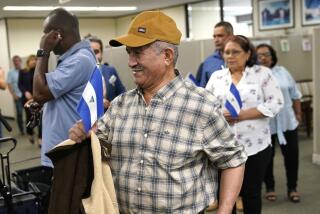More Cubans May Be in Nicaragua : Castro Increases Troop Advisers, State Dept. Says
- Share via
WASHINGTON — The State Department has received reports that Cuba has dispatched “several hundred” more military advisers to help the Sandinista government counter rebel attacks, an informed official said Saturday.
“I think there’s evidence to confirm that Cuban advisers have been coming in since late December,” the official said, speaking on condition that he not be identified.
The number of Cubans in Nicaragua has been relatively stable for some years, and the official attributed the increase to the United States’ release last November of $100 million in aid to the contras . During the previous two years, Congress had banned all such aid. With renewed supplies, contra troops began to infiltrate deep into Nicaragua again, moving the action away from the border areas to which they had been restricted by arms shortages.
The leftist Sandinista regime last year conceded that 800 Cuban military personnel were in Nicaragua. However, Reagan Administration officials believed their number to be as much as three times higher. The military advisers were in addition to about 2,500 Cuban civilians who serve as teachers, health workers and technical advisers.
Civilian Contingent
In addition to military reinforcements, the Cuban civilian contingent has undergone a gradual change since a similar Cuban presence was driven from the Caribbean island of Grenada in 1984, the U.S. official said. At the orders of Cuban President Fidel Castro, women and older men have been replaced by younger men who have recently completed army service so that the civilians can fight if necessary.
Cuban military advisers have piloted Soviet MI-24 helicopter gunships for the Sandinista forces, giving them better mobility in chasing invading contras. Other advisers have worked with Sandinista troops in training and in plotting strategy for the anti-guerrilla campaign, but they are not believed to have participated directly in ground combat.
Adolfo Calero, a leader of the United Nicaraguan Opposition, the political umbrella organization under which the contras operate with varying degrees of unity, last week claimed that renewed U.S. aid had enabled 6,000 rebels to drive deep into Nicaragua with minimal resistance, meeting an enthusiastic welcome from the populace. He claimed that if U.S. support is maintained, his contra faction, the Nicaraguan Democratic Force, can have 15,000 men inside Nicaragua later this year.
The Managua government denied that major contra incursions have taken place and pointed out that not even Calero claims to control a single town. It also rejected Calero’s assertion of contra dominance over the economically important coffee-growing region, contending that the coffee harvest is taking place without interruption.
Battlefield Success Needed
With the warning in congressional testimony last Thursday by Adm. William J. Crowe Jr., chairman of the Joint Chiefs of Staff, that continued U.S. public backing for the rebels will require battlefield success, Calero’s declaration was an obvious attempt to stake such a claim.
The Administration official said the Sandinistas, no less anxious to play on U.S. opinion, have called for more Cuban military help to frustrate possible contra gains.
The Administration expects to ask Congress to give another $105 million in rebel funding for fiscal 1988, beginning Oct. 1.
“As much as Calero wants to see that money, the Sandinistas don’t want him to,” the official said. “He’ll be doing everything he can in the next two months, and the Sandinistas and the Cubans will be doing everything they can to stop him. The Cubans were with the Sandinistas in Costa Rica before the defeat of (former Nicaraguan dictator Anastasio) Somoza in 1979, and they’re not going to abandon them now.”
Support Has Waned
Both sides are aware that congressional support for U.S. intervention in Nicaragua has weakened since the November elections and the disclosure of the White House’s diversion of funds from the sale of arms to Iran to plug the gap in contra aid.
A survey by the Cuban American National Foundation, which supports contra funding, reported this month that of the 10 new Democratic senators who ended Republican control of the Senate, four already opposed to the aid won seats whose previous holders voted against U.S. backing for Calero’s organization. Another four opponents of financial support replaced legislators who had favored it. Two Democrats, Bob Graham of Florida and Richard C. Shelby of Alabama, are on record as favoring Reagan Administration policy.
With Sen. Christopher S. Bond (R-Mo.), a supporter, replacing an opponent of aid, there has been a net shift of three votes against the Administration in a Senate that voted by a margin of only 53 to 47 last March to resume support for the contras. Thus, on this record, the Senate is evenly divided on the issue, leaving the possibility that Vice President George Bush may be called on to break a tie.
In the House, which voted 221 to 209 last June to approve resumption of aid, 21 of 50 new members surveyed by the Cuban American National Foundation were reported to favor funding, while 17 were opposed, three were undecided and the remainder failed to respond.
More to Read
Sign up for Essential California
The most important California stories and recommendations in your inbox every morning.
You may occasionally receive promotional content from the Los Angeles Times.













